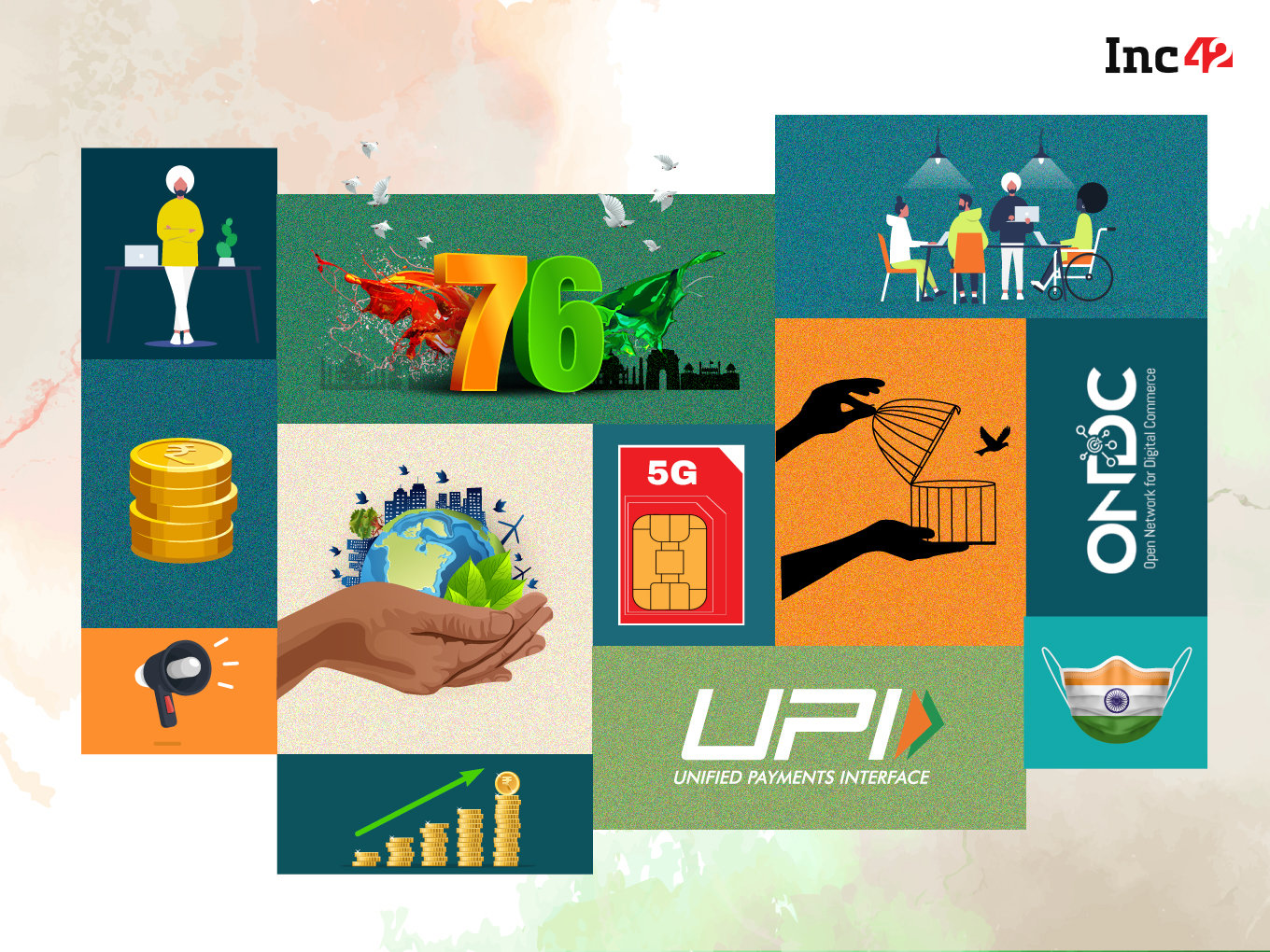SUMMARY
As India’s 76th year of independence begins today, we turn our focus on the freedoms earned by Indian startups in the past few years and what's to come
A very happy Independence Day to all Indians everywhere from Team Inc42. It’s a day to cherish our freedoms and memorialise the hard roads we took to get them.
It’s been a year of struggles for Indian startups, but as Indians all over the world celebrate the 77th Independence Day and India’s 76th year of freedom, we wanted to talk about what this struggle has yielded.
Last year, we spoke about the paradox that is Digital India because we saw that the Indian internet economy’s growth is at times tempered by debatable policy decisions and a digital divide. And while many of these macro issues persist today, Indian startups have found some rays of hope in the gloom and doom of the past 12 months.
Not only have more entrepreneurs returned to the table to build again but there’s also a renewed freedom to pursue niche business models. Further, we have seen digital public goods become a major factor in the past year, driving innovation among incumbents. On the investor side, there’s more enthusiasm to back early-stage innovation and to be part of the startup ecosystem’s growth story.
But at the same time, we cannot ignore what we need to work towards — a lot more focus on corporate governance, cutting the reliance on external funding and building with a bootstrapped mindset, shedding vanity metrics and an effort to build efficient models despite regulatory hurdles.
As India’s 76th year of independence begins today, we are looking to focus on what we have achieved in the past year, and why Indian startups need freedom from regulatory bottlenecks, the shortsightedness of leaders and vanity metrics-driven faulty business models that are holding back the potential of the world’s third-largest startup economy.
Freedom From Bad Actors & Founder Myopia
There’s no way around it. We have seen several unscrupulous acts in the past year and only a handful have actually made the headlines. Investors and limited partners are enforcing stricter processes in the aftermath of the litany of allegations about revenue inflation, forging of books and more. We all know the names.
What needs to be celebrated is the spotlight on best practices and governance standards, which are fast becoming investment criteria. And VCs are delivering the message clearly even in their existing portfolios, which has even resulted in founders coming clean and confessing.
Granted, a lot of these issues are being swept under the rug before they make the headlines, but there’s certainly a push towards stronger controls, which is highlighted by the several CFO and independent director appointments in the past few months.
Inc42’s ‘The State Of Indian Startup Ecosystem Survey 2023’ shows that just 36% of surveyed investors have high confidence in the startup governance standards. It’s a clear focus area for VCs.
Freedom From Over-Reliance On VC Money
The biggest startups in the country are making strides towards profitability (even though some of them are mere claims at the moment). But just consider Zomato’s first-ever net profit, Paytm coming within touching distance of doing the same and listed companies generally turning things around in the first quarter of FY24.
In the case of startups too, the focus has turned to customer money rather than VC money. Consumer internet startups are experimenting with subscription models that increase stickiness. Many are also reducing their reliance on discounts by leveraging customer data or with the right channel mix.
The efficiency in unit economics is bound to trickle down from listed companies to startups. That’s the nature of the market.
Freedom From Vanity Metrics
Even in the age of profitability, startups will need external funding rounds for working capital. And while founders have long relied on vanity metrics such as GMV, downloads and user base to court investors, profitability is the master metric today with a sharp focus on unit economics and contribution margins.
The experience of the past year brings some hope that new funds will likely be utilised towards actually moving the revenue needle rather than for hollow growth. Even though funding is the lifeblood of startups, the incentives from investors are changing.
The spate of write-offs and markdowns has prompted investors to insert conditions in term sheets related to tranches, such as revenue or profitability benchmarks, IPO targets and more.
Freedom From Rampant Regulation
Best-laid plans can be derailed by regulators. Startups and investors have benefitted from policies but many rules and regulations tend to blindside them as well.
Whether it is the RBI’s strict eye on the fintech sector or the ever-changing landscape for ecommerce, gig economy platforms, consumer internet companies, taxation for angel investors, crypto and now online gaming, there’s always something new around the corner that startups have to grapple with.
The most recent Digital Personal Data Protection Act could prove to be another significant headwind for tech startups. In response to the waves of regulations, startups have teamed up in the form of self-regulatory bodies and have also achieved greater say in key lobbying bodies such as IAMAI, but the side effect of interventionary regulation is that it disrupts existing models, and that’s something startups definitely need freedom from.
Undoubtedly there’s a lot of ground to cover for the startup ecosystem, but the past year has also unearthed some positive trends that have proven to be liberating for founders and investors.
Freedom To Start Up Again
Amid the ongoing funding winter, there’s also a spring of second-time and serial founders starting up again in India. The churn has brought in fresh optimism for founders.
The trend of serial entrepreneurs launching new startups with a bang has been clear for a number of years even before 2023. And now, the funding winter has accelerated plans for many founders who have been mulling exits from their existing ventures. Early stage capital is more easily available than growth capital and ideas are more likely to be backed if there’s an experienced hand running things.
There’s a realisation that product-market fit is more critical now and this opens up the field for new ventures. In other cases, entrepreneurs are no longer able to influence matters in their company because perhaps the startup has pivoted or simply because their role which may have been critical at one time, is no longer relevant.
For founders starting up again, often they already have the investors in place. Due diligence gets even thinner in the case of a noted founder and past experience reduces chances of failure in many cases.
Freedom To Retreat From Loss-Making Areas
While some founders have the luxury of starting over, others have to see their startups through a rough patch.
The layoffs that have plagued the startup ecosystem are a sign that cutting off a stunted branch is often better than letting the tree suffer. Startups have looked to retreat from loss-making verticals and shut businesses that proved to be cost drains. Growth at all costs and in all areas is simply not sustainable. The freedom that comes from knowing this will create more sustainable employment at startups in the long run.
Now, layoffs are terrible. We don’t see that as a good thing, but this experience could yet prove to be a valuable lesson for startups to chase value instead of just outright scale.
Freedom To Add Value As Investors
India’s wealthy class is moving away from investing in public markets to private startups. Some of the most storied investors across stages are approaching LP management through a domestic lens and tapping India’s vibrant family office and HNI landscape for new fund raises.
The influx of domestic capital is about to unlock the future of startups as an asset class in India. As startups have entered the mainstream, even the most inexperienced investors are looking for a piece of the action.
As we saw at MoneyX last month, VCs and PE firms, family offices, HNIs and angel investors are now looking at the Indian startup opportunity with a more bullish lens, as far as the next decade is concerned.
Freedom To Leverage Digital Public Infrastructure
India is a unique market, where monetisation has long remained an elusive target for consumer internet startups. The same could even be said for fintech companies that have en masse entered into digital lending from various parts of the financial services world.
Even ecommerce companies have struggled with scaling up due to logistics hurdles or challenges in seller partnerships. But one thing that has undoubtedly eased the operational overheads for many startups is the high degree of digital public infrastructure in India — from UPI to IndiaStack to ONDC and other initiatives that seek to democratise vital sectors.
From the successful rollout of the UPI to the beta launch of the ONDC, a slew of state-backed projects have taken off in the past few years. While Aadhaar has been the building block, the overall architecture is part of the larger IndiaStack which also includes other in-progress products such as the Open Credit Enablement Network (OCEN) and a potential insurance-related offering.
If not directly enabling startup business models, digital public goods have created the foundation for the adoption of digital services through consent-based data sharing, interoperability, easing friction, and removing entry barriers for digital adoption.































 Ad-lite browsing experience
Ad-lite browsing experience